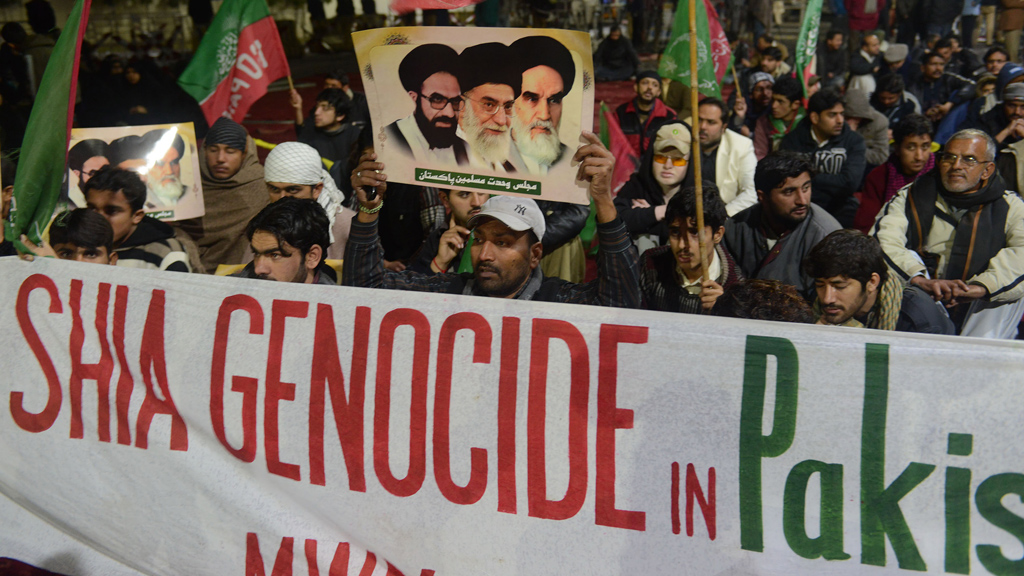Pakistan, already suffering the worst sectarian divide, witnesses another rise in sectarian extremism after the outgone Pakistan Democratic Movement Government passed contentious amendments in the country’s blasphemy laws which not only sparked protests by Shiites and Sunnis in opposition and support of the bill respectively but also cause a sharp rise in the blasphemy cases during the last two months.
The amendments were proposed by a private member which was passed by the National Assembly and then by the Senate without any major consideration. Only the Pakistan Peoples’ Party had opposed the process of including the amendments that enhance punishment for making derogatory remarks against religiously admired personalities from three years in prison to ten years and a fine of Rs1 million. The amendments also deprive the accused of getting bail by declaring derogatory remarks against the religiously revered personalities, Sahaba and Ahle e Bait (Companions and Family Members of Prophet Muhammad Peace Be Upon Him), a non-bailable offence.
After the rights groups, Shiites and some Sunni scholars expressed strong concerns about the possible outcome of the amendments, President Arif Alvi sent back the bill to the Senate for reconsideration.
The immediate outcome was seen in Gilgit Baltistan, formerly known as Northern Areas, where Alhle Sunnat wal Jamaat (AWSJ), known as the banned Sipah e Sahaba) blocked Chilas Road in support of the Bill and demanded the arrest of Agha Baqir Hussain, a strong Shiite leader from Skardu in a blasphemy case. On the other hand, Shiites staged mammoth protests against the Bill and registration of a blasphemy case against Agha Baqir in Skardu. The Shiite protestors demanded the withdrawal of the amendments and case against them besides getting Chilas Road clear of the protests. They warned that they would march toward Kargil and take the Muzaffarabad route to Islamabad if their demands were not met.
Muhammad Asghar Ali, a close aide to Agha Baqir, told this scribe, “Shiites have been reciting Ziyarat e Ashura (a prayer, Shiite recite) for the last several hundreds of years. The prayer curses those killed Imam Hussain (AS), the grandson of the Prophet Muhammad (PBUH).” Agha Baqir recited the prayer after which a blasphemy case was registered against him, and police tried to arrest him, he added.
On the other hand, the AWSJ continued raising voices in support of the bill. The AWSJ Chief Maulana Muhammad Ahmad Ludhianvi urges the government to implement the bill without any delay to stop disrespect towards Sahaba.
The Sectarian violence between Shiite and Sunni groups has a long history in the subcontinent. Pakistan also started to witness this phenomenon soon after its independence in 1947. Several large-scale riots erupted in Pakistan in the 1950s, 1970s, and then 1980s. But the sectarian violence took a violent form after 1979 as the result of Iran’s Revolution and War against the former USSR in Afghanistan.
All the Sunni militant groups were nurtured during the Afghan War on Afghanistan’s soil. The AWSJ’s militant wing, Lashkar e Jhangvi emerged as the most feared terror network which in past had strong links with Al-Qaeda, Afghan Taliban, Tehrik e Taliban Pakistan and Islamic State which is not Islamic State-Khorasan. Exact statistics about the sectarian-related killings are not available but thousands from both sides were killed in the incidents of targeted killing, planted bombings and suicide bombings. X (Twitter) is often eclipsed by the sectarian top trends in Pakistan.
Secretary Human Rights Commission of Pakistan Haris Khaliq said, “There are two problems with the amendments. One, the law after the amendments is inclusive. Two, it was not supported by the whole National Assembly and a couple of dozens of members were present when the amendments were approved without proper discussion in the house.” He said that Pakistan is already struggling with the bogus or false cases of blasphemy. He added that the government should have handled the amendments carefully, measuring the pros and cons of such legislation.
Image: en.qantara.de

